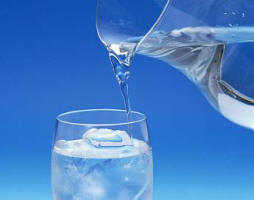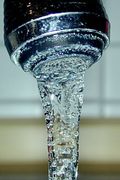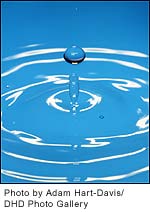 Call for abstracts for SWUP-MED Project Final Conference: "Sustainable water use for securing food production in the Mediterranean region under changing climate"
Call for abstracts for SWUP-MED Project Final Conference: "Sustainable water use for securing food production in the Mediterranean region under changing climate"
Background
Water availability is a prerequisite for the sustainable development of the Mediterranean region. Most of these countries currently suffers of water crisis due to population growth and subsequent increasing water demand against very limited renewable water resources that are unequally distributed in space and time. As early as 2015, almost all southern Mediterranean countries will be below the level of severe water scarcity at less than 500 cubic meters per capita per year; nine countries will be below 200 cubic meters, six of which below 100 cubic meters and climate change will worsen the situation. Over 85% of fresh water is used for agriculture, with more than half wasted due to unsustainable practices. Efficiency levels of water for human use are low, even in countries under chronic stress.
Given this context, food crop production is restricted in the Mediterranean region. Typical food and feed crops cultivation (cereals, legumes, pastures) under semi-arid and arid conditions in Mediterranean countries are affected by increasing multiple abiotic stress factors brought about by climate change. There is a need to improve food production by introducing climate-proof varieties in crop rotations of wheat, grain legumes and new crops (potentially high value food cash crops). Moreover, in a rainfed system with supplemental irrigation or in irrigated areas, there is a need to improve water productivity without effecting quality, using marginal-quality water (e.g. saline, brackish groundwater, treated waste water) and harvested rainwater. These measures are expected to accelerate the adoption of improved agricultural practices and support small farmers’ livelihood and income levels.
Objectives of the conference
The SWUP-MED conference is an opportunity for the Mediterranean scientists to exchange knowledge and experience of their research work related to climate change and its impact on the sustainable development of the Mediterranean region.
The aim of this conference is to analyze and give recommendations on how to improve food and feed production by introducing climate-proof crops and pastures in crop rotations, in rainfed and irrigated agriculture systems, applying deficit irrigation, using marginal-quality water and harvested rainwater.
Participants
Although, this conference is intended to disseminate the SWUP-MED EU funded project, it is also open to all interested participants. It will provide the opportunity to bring together scientists, decision-makers, farmers, and international organizations. The SWUP-MED partners representing countries from the EU (
Conference Topics
The conference will focus on the following themes:
• Improved crops and cropping systems in the Mediterranean region under the impact of climate change
• Sustainable agronomical practices to mitigate and adapt to climate change for stabilizing and improving yield and quality of selected crops and species.
• Use of marginal-quality water (e.g. saline water, treated wastewater, etc.) and the environmental impact assessments due to the use of such water.
• Socio-economic factors affecting farmers´ acceptance to adopt new farming systems and new crops;
• Modeling the integrated water, land, fertilizers and crop management for saving fresh water, producing optimum yield and safeguarding the environment;
• Policy regulations for implementing guidelines dealing with climate change adaptation in Mediterranean agriculture.
Programme of the Conference
The conference is divided into four sessions:
Session I: Improved crops and cropping systems in the Mediterranean region for adaptation to climatic change
- Improved crop rotations with legumes and new crops
- Conservation agriculture: water and carbon management by soil tillage and other techniques
- Farming systems for efficient use of natural resources
- Selection of genotypes that are tolerant to abiotic stresses
- Physiological and molecular crop responses to abiotic stress
- Adaptation of new crops to Mediterranean environments (e.g. quinoa, amaranth)
Session II Sustainable agronomic practices to mitigate abiotic stress to stabilize and improve yield and quality of crops.
- Cultural practices (tillage, organic manure, supplemental irrigation, seed priming, etc.) for improving crop yield under drought and other stresses
- Adaptation of agriculture to climatic change: Changing sowing harvest and fertilizers application times, coping with climate extreme events such as drought and flood by integrated management to land and crops, selecting suitable weather proof crops and maximize the use of rainfall at farm level
Session III: Environmental impact assessment of using unconventional water resources (e.g. saline water, treated wastewater, etc.)
- The safe use of saline water and treated wastewater for agricultural production
- Deficit and supplemental irrigation impact of unconventional water on crop production
- Environment impact assessment of using unconventional water in agriculture
- Modeling the integrated water, crop, fertilizers and field management for saving fresh water, and producing optimum yield.
Session IV: Socio-economic and policies in relation to the climate change impact
- Socio- economic impact of cultivating new crops on farm income
- The Green economy and agriculture production
- Guidelines for cropping under abiotic stress
- Policies and regulations in relation to climate change impact and its abiotic stresses in Mediterranean agriculture
Language
The official languages of the conference will be English. Translation service will be available from English to French and vice versa during the open day for stakeholders.
Venue
The venue of the conference will be at the Beach Club Hotel (4 stars A) in Agadir. There will be accommodation available at the hotel at a special rate. Lunches and refreshments will be provided at the conference. There are excellent facilities for common sessions, posters sessions, exhibitions and welcome reception at the hotel.
Field trips
The conference will organize two field trips. The first trip is half a day to the experimental station of IAV Hassan II Agadir, with focus on supplemental irrigation using marginal water (brackish water, saline water and treated wastewater) to grow quinoa, cereals and legumes.
The second trip is a post conference tour to the Bouchen quinoa farmers’ association, returning via the great city of
Publications
Abstracts received will be reviewed before acceptance to be presented at the conference. The conference proceedings based on the full papers will be published in a special issue of a peer-reviewed scientific journal.
Invitation to submit a Paper
Abstracts should contain the title of the contribution, the name and affiliation of the authors, and the address for correspondence, including phone and e-mail. The abstract should not exceed 500 words. Please use font size 12” of New Times Roman, 1.5 line spacing. The subject of the presentation should be focused on the topics of the conference The Scientific Committee will communicate to the authors the provisional acceptance of their contributions to the conference. All selected authors will be informed in which session they will be presenting their oral paper or their poster.
Important Dates
Final date for abstract submission 20 November 2012
Acceptance and invitation to submit full paper: 30 December 2012
Registration and hotel reservation 15 January 2013
Final date for submission of full papers 10 February 2013
CONTACTS
Questions regarding registration, administrative matters, and technical issues can be addressed to Prof. Redouane Choukr-Allah,
Email redouane53@yahoo.fr,
Phone : 00 212 661 203694,
Fax: 00 212 528 243333.
Local Organizing Committee
Prof. Redouane Choukr-Allah IAV Hassan II Agadir,
Pr. Ouafae Benlhabib, IAV Hassan II Agadir,
Ir. Sanaa Zebakh, IAV Hassan II Rabat,
Dr. Fatiha Fdil, Environmental Observatory,
Ir. Abdessadek Nghira ABH Agadir
Ir. Hassan Bellouch ORMVA/SM, Agadir
Ir. Embarek Boujaajat, RAMSA, Agadir
Miss El Omari Halima, IAV Hassan II Agadir,
Mr. Mohamed Tafraouti, Magazine Environment Development,
International Organizing Committee
Prof. Redouane Choukr-Allah, IAV Hassan II Agadir,
Dr. Sven-Erik Jacobsen, UCPH,
Mrs Sabrina Ruzanski, UCPH,
Dr. Ragab Ragab, NERC, United Kingdom
Dr. Khaled Abu Zeid, CEDARI,
Pr. Atef Hamdy, IAM
Scientific Committee
Prof. Dr. Sven-Erik Jacobsen, UCPH,
Prof. Riccardo d
Prof. Ragab Ragab, NERC, United Kingdom
Prof. Manuela Chaves, ITQB,
Prof. Ouafae Benlhabib, IAV Hassan II Agadir,
Prof. Redouane Choukr-Allah, IAV Hassan II Agadir,
Prof. Attila Yazar,
Dr. Manzoor Qadir, ICARDA,
Dr. Jens Erik Ørum, UCPH,
Prof. Dr. Kadambot Siddique, the
--
Related info.:
Swup-med: a project for available water resources in cultivation
SWUP-MED
http://cordis.europa.eu/search/index.cfm?fuseaction=proj.document&PJ_RCN=10257048
http://ec.europa.eu/research/bioeconomy/agriculture/projects/swup-med_en.htm
| Periodic Report - SWUP-MED (Sustainable water use securing food production in dry areas of the Mediterranean region) | 21/09/2011 |
| Contact information |
Redouane Choukr-Allah, PhD Professor of Horticulture Head of the Salinity and Plant Nutrition Laboratory Department of Horticulture Institut Agronomique et Vétérinaire Hassan II, Complexe Horticole d'Agadir BP 773, Agadir Principale, 80 000
(email: redouane53@yahoo.fr) Phone: +212 528 24 3333/0155/2026 Mobile:+212 661 203694 Fax:+212 528 242243 |
|---|---|
| News type | CallForPaper |
| File link |
http://www.emwis.net/thematicdirs/events/2013/03/swup-med-project-final-conference-sustainable-water-use-securing-food-production |
| File link local |
|
| Source of information | SWUP-MED Project |
| Keyword(s) | EU-INCO-MED, FP7, drought,farming systems,Multiple stress,soil salinity,tolerance to abiotic factors,marginal-quality water,saline water,treated wastewater |
| Subject(s) | AGRICULTURE , ANALYSIS AND TESTS , CHARACTERISTICAL PARAMETERS OF WATERS AND SLUDGES , DRINKING WATER , DRINKING WATER AND SANITATION : COMMON PROCESSES OF PURIFICATION AND TREATMENT , ENERGY , FINANCE-ECONOMY , HEALTH - HYGIENE - PATHOGENIC MICROORGANISM , HYDRAULICS - HYDROLOGY , INDUSTRY , INFORMATION - COMPUTER SCIENCES , MEASUREMENTS AND INSTRUMENTATION , METHTODOLOGY - STATISTICS - DECISION AID , NATURAL MEDIUM , POLICY-WATER POLICY AND WATER MANAGEMENT , PREVENTION AND NUISANCES POLLUTION , RISKS AND CLIMATOLOGY , SANITATION -STRICT PURIFICATION PROCESSES , SLUDGES , WATER DEMAND , WATER QUALITY |
| Relation | http://www.emwis.net/initiatives/fol060732/sustainable-water-use-securing-food-production-dry-areas-mediterranean-region/edit_html |
| Geographical coverage | Morocco |
| News date | 03/08/2012 |
| Working language(s) | ENGLISH , FRENCH |
 you are not logged in
you are not logged in





